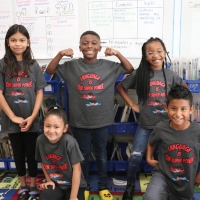- 2025-2026 Helpful LinksEnlaces útiles 2025-2026
- School MealsServicios de comidas
- School Supply ListsLista de útiles escolares
- Student RegistrationInscripción de estudiantes
- TransportationTransporte
- Weather Related Closings & DelaysCierre e inicio tardío debido al clima
- Resilience Education CenterCentro Educativo de Resiliencia
- Free Summer MealsComidas de verano gratis
- e-learning planPlan de aprendizaje remoto (e-learning)
- Family COVID-19 Medical ResourcesRecursos medicos de COVID-19 para familias
- Google Training and Resources For ParentsFormación y recursos de Google para padres
- Google Training and Resources for TeachersFormación y recursos de Google para maestros
- School Day ScheduleHorario del día escolar
- Approved Online ResourcesRecursos Aprobados en línea
- Assessments & AccountabilityEvaluaciones
- Attendance and AbsencesAsistencia y ausencias
- Aurora Area ResourcesRecursos en Aurora
- Bullying PreventionPrevención de Intimidación
- Student Accident InsuranceSeguro de accidentes para estudiantes
- Student Online Personal Protect ActLey de protección personal de los estudiantes en línea
- McKinney-VentoMcKinney-Vento

Join us for our next Board MeetingJoin us for our next Board Meeting
Our Board of Education meetings take place the first and third Monday of each month at 7:00 p.m. Please join us!Nuestras reuniones de la Junta de Educación se llevan a cabo el primer y tercer lunes de cada mes a las 7:00 p.m. ¡Por favor acompañenos!
- AssessmentsEvaluaciones
- District Approved AppsAplicaciones aprobadas por el distrito
- Frontline (AESOP/MLP)Frontline (formerly AESOP & My Learning Plan)
- Edupoint SynergyEdupoint Synergy
- Infinite VisionsInfinite Visions
- IT & Maintenance Help TicketAyuda de tecnología
- O365 Document Portal0365 Portal de documentos
- O365 OneDriveO365 OneDrive
- Union OfficialsOficiales de la Union

Join us for our next Board MeetingJoin us for our next Board Meeting
Our Board of Education meetings take place the first and third Monday of each month at 7:00 p.m. Please join us!Nuestras reuniones de la Junta de Educación se llevan a cabo el primer y tercer lunes de cada mes a las 7:00 p.m. ¡Por favor acompañenos!

Calling All Bilingual Educators!¡Llamando a todos los educadores bilingües!
Looking for a rewarding teaching career? Our district is actively hiring bilingual teachers! We offer competitive salaries based on your level of education, plus incredible incentives.¿Buscas una carrera docente gratificante? ¡Nuestro distrito está contratando activamente maestros bilingües! Ofrecemos salarios competitivos según tu nivel educativo, además de increíbles incentivos.

Join us for our next Board MeetingJoin us for our next Board Meeting
Our Board of Education meetings take place the first and third Monday of each month at 7:00 p.m. Please join us!Nuestras reuniones de la Junta de Educación se llevan a cabo el primer y tercer lunes de cada mes a las 7:00 p.m. ¡Por favor acompañenos!
- Aries "Jaybird" Gonzalez Child CenterAries "Jaybird" Gonzalez Child Center
- Early Childhood CenterEarly Childhood Center
- East Aurora ExtensionEast Aurora Extension
- East Aurora High SchoolEast Aurora High School
- Resilience Education CenterResilience Education Center



